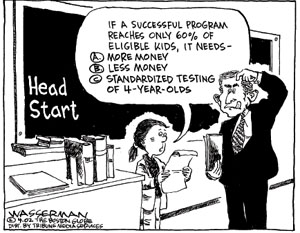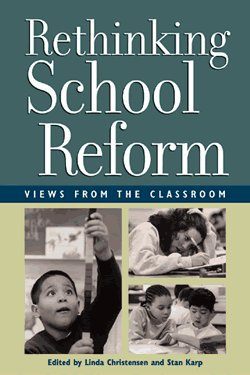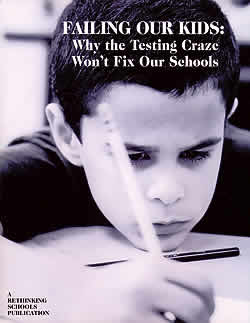Anniversaries are often cause for celebration… but the 10th anniversary of No Child Left Behind is mostly a time for damage assessment. A new report from FairTest sums up the fallout from the “lost decade of NCLB:” stagnating test scores, narrowed curriculum but not narrowed achievement gaps, extra collateral damage for the most vulnerable students and communities.
This massive, bipartisan, wrong turn in federal education policy has been a colossal failure, even on its own test-score terms, and the damage will continue until we force a change in federal policy.
NCLB dramatically expanded the federal role in education, but transformed it for the worse. It shifted federal policy away from its historic role as a promoter of access and equity in public education through support for things like school integration, Title I funding for high poverty schools, and services for students with special needs. Instead, it mandated top-down micromanagement of assessment and “accountability” policies that Washington had no clue about or capacity to do well. This bad law helped consolidate the shift of decision-making about teaching and learning away from educators and classrooms to state and federal bureaucracies.
 NCLB’s mandate to test every kid every year in every grade and measure the results against benchmarks that no real schools had ever met was never a credible “accountability” system. It was an enabling mechanism for creating a narrative of public school failure and imposing sanctions that were not educational strategies at all, but political strategies designed to promote privatization and market reform.
NCLB’s mandate to test every kid every year in every grade and measure the results against benchmarks that no real schools had ever met was never a credible “accountability” system. It was an enabling mechanism for creating a narrative of public school failure and imposing sanctions that were not educational strategies at all, but political strategies designed to promote privatization and market reform.
This approach predictably produced profiteering and educational chaos. “This reads like our business plan,” said the CEO of Pearson, Inc., when he first saw the plans for NCLB. It’s been a gold-rush decade for textbook and test publishers.
But for schools, teachers, parents and students, it’s been a nightmare. NCLB’s testing mania seeped into every classroom and its sanctions fueled the rush to deregulated charters and teacher bashing. By the end of 2011, nearly 50,000 schools failed to meet NCLB’s absurd annual yearly progress targets. All 50 states had considered legislation rejecting all or part of NCLB and the law was almost as unpopular as the Congress that created it. The bipartisan coalition that originally passed NCLB was in shambles and the law was collapsing of its own weight.
Yet NCLB continues, zombie-like, to threaten schools with sanctions and bombard them with mandated tests. Like a bad Hollywood horror movie, it is also spawning sequels. Given an opportunity to learn from a decade of policy failure, the Obama Administration and Secretary of Education Arne Duncan instead doubled down on NCLB’s “test and punish” approach to reform. Much as it traded one destructive war in Iraq for another in Afghanistan, the Administration morphed one counterproductive set of education policies into another.
Obama-Duncan’s Race to The Top uses the same flawed test score tools to drill deeper into the fabric of schooling. Where NCLB imposed penalties on schools and students (e.g., grade retention, diploma denial), test-based sanctions are now increasingly targeted at teachers. Left unchecked, these trends will undermine the teaching profession and create a less experienced, less secure, less stable and less expensive professional staff.
Duncan has also pioneered new directions in bad policy, distributing federal education dollars through “competitive grants” to “winners” at the expense of “losers,” and bribing states to adopt the Administration’s unproven pet reforms. Unable to secure Congressional agreement to reauthorize NCLB, Duncan devised a dubious waiver process that will increase the pressure on 5,000 schools serving the poorest communities at a time of unprecedented economic crisis and budget cutting. While the waiver plan rolls back NCLB’s AYP (adequate yearly progress) system as it was about to self-destruct, Duncan’s new guidelines require states to identify up to 15% of their schools with the lowest scores for unproven “turnarounds,” “charterization,” or closure.
It’s increasingly clear that we will only get the changes we need in federal education policy when pressure forces them from below. We need to occupy education policy the same way we need to occupy Wall Street. This is one reason we should mark the 10th anniversary not only by redoubling efforts to get rid of this bad framework for federal education policy, but by remembering those who saw the disaster coming and sounded the alarm from the beginning.
While politicians and pundits led the race over the cliff, there were many educators and advocates who were speaking truth to power: the much-missed Jerry Bracey, Susan Ohanian, Alfie Kohn, Monty Neill and FairTest, Deborah Meier, Bill Mathis, Richard Allington, George Wood, and many others, including Rethinking Schools, saw through NCLB’s false promises and hollow rhetoric from the start. That’s worth remembering too as we chart the way forward to a better, post-NCLB future.
Related Resources:
 Rethinking School Reform puts classrooms and teaching at the center of the debate over how to improve public schools. This collection offers a primer on a broad range of pressing issues, including school vouchers and funding, multiculturalism, standards and testing, teacher unions, bilingual education, and federal education policy.Informed by the experience and passion of teachers who walk daily into real classrooms, Rethinking School Reform examines how various reform efforts promote — or prevent — the kind of teaching that can bring equity and excellence to all our children, and it provides compelling, practical descriptions of what such teaching looks like. Edited by Linda Christensen and Stan Karp.
Rethinking School Reform puts classrooms and teaching at the center of the debate over how to improve public schools. This collection offers a primer on a broad range of pressing issues, including school vouchers and funding, multiculturalism, standards and testing, teacher unions, bilingual education, and federal education policy.Informed by the experience and passion of teachers who walk daily into real classrooms, Rethinking School Reform examines how various reform efforts promote — or prevent — the kind of teaching that can bring equity and excellence to all our children, and it provides compelling, practical descriptions of what such teaching looks like. Edited by Linda Christensen and Stan Karp.
The long arm of standardized testing is reaching into every nook and cranny of education. Yet relying on standardized tests distorts student learning, exacerbates inequities for low-income students and students of color, and undermines true accountability. Failing Our Kids includes more than 50 articles that provide a compelling critique of standardized tests and also outline alternative ways to assess how well our children are learning. Edited by Kathy Williams and Barbara Miner
Coming soon!
Pencils Down: Rethinking High Stakes Testing and Accountability in Public Schools, edited by Wayne Au and Melissa Bollow Tempel.


